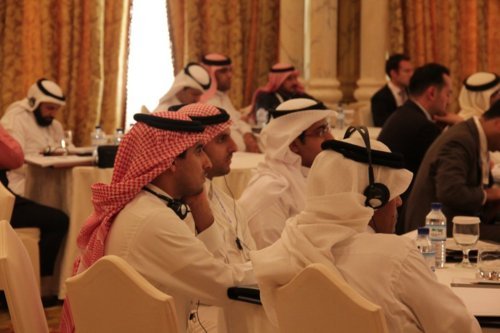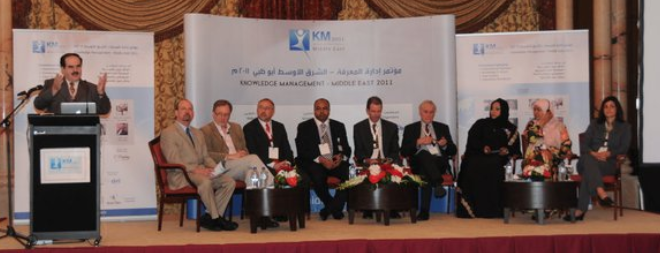On the first day I’d tweeted
‘Difficult to assess whether audience will ask questions; only one allowed thus far per session and all been from visitors to the region’.
Despite a very convivial lunch with my fellow panellists to discuss options it isn’t readily apparent what will meet the objectives to send the delegates away with a smile on their face, with a set of real ‘takeaways’ and bring the conference to a memorable conclusion.
Having been given the remit to do what I think appropriate it is going to be a case of trust my instinct and make sure there is enough interesting content to back me up if I needed it.
After a very promising start on Day One, with 150 people attending the keynote presentation and official opening by Stephen Mak HK Government’s recently appointed Chief Information Officer, the crowd thinned perceptively for the remainder of the event prompting the thought that being seen to sign up is more important than attending.
Those who stayed the course (probably an average of 50 per session) looked like they got their money’s worth and I take the opportunity, having watched Hazel Hall perfect the art at the 2010 Online Conference, of tweeting the bits I feel worth recording.
My ears prick up when Stephen Mak suggests that HK has Communities of Practice at the heart of its drive to build a knowledge based society. This was worth a question; in the interests of timekeeping my request to speak is declined so I corral Stephen before he leaves for a more pressing engagement of putting Information and Communications Technology & Knowledge at the disposal of HK’s population – its Digital 21 Strategy! Yes he says they do use CoP’s but only for internal purposes and then among the IT community. And off he sweeps to perform the opening ceremony which involved dragons, sticks and tambourines.
An intranet consultant from Singapore then talks about an assignment in Manila arguing that an Intranet is the blood line of an organisation; the most important part of an IT infrastructure. Again I was interested since the client is Asian Development Bank an organisation we’d come to know and respect greatly a year or so back. His premise that ‘culture is what happens when a boss leaves the room’ an interesting take on working in Asia further reinforced by an insightful presentation from a Thai energy company who impose through KPIs a requirement on their engineers to contribute to Communities of Practice. Here’s the conundrum:
- while workers in Asia are taught to respect their superiors, follow their directives and defer to them in conversations, do ‘hits’ or ‘contributions’ to a lessons learned database enforced via a must contribute policy represent a real change in the way an organisation is working? Or is it merely the way things get done around here and some contribution is better than no contribution?
This conundrum was vividly illustrated later in a Q&A panel which included a session on Open Source technologies:
Q. what are the reasons for OS community here not growing up? A. No evidence that people in Asia will to contribute to online forums
Which brings me back full circle to my closing session dilemma: would a very eclectic public audience of mixed race, faith and gender be willing to embrace Sparknow’s participative work-shopping approach?
Here’s what I did:
- rearrange the room by stacking previously unused chairs to get a much tighter feeling among the delegates.
- prepare a brief presentation with plenty of illustrations to provide a backdrop to a conversation about how information and knowledge professionals needed to adapt.
- ask the other panellists to sit in the audience for most of the session and use them as catalysts for conversations.
- invite the delegates to consider what their three ‘takeaways’ are from the event (including the exhibition) and then to have a conversation with the person next to them about their choices.
- at this point my fellow panellists (Robert, Bonnie and Waltraut) and I engage with anyone looking left out and the level of animated conversation bears testimony to a willingness to have a say at least in a small group.
- I now want to invite the delegates to voice opinions but fear asking them from behind a lectern will be unproductive. Instead I pass the roving microphone to Robert Hillard (the keynote speaker and one of the panellists who is in the audience) to give me his. Robert bemoans the lack of a open forum for information professionals in the region.
- rather than give it back to me I invite him to select someone else in the audience and pass the microphone on to them. That simple act both diffuses and increases tension; everyone watches anxiously to see if they are selected but focuses on what they might say if they are. It has become much more light hearted and I am able to joke about who is next and throw in anecdotes as the mike moves around.
- this continues for 20 minutes or so; everyone who wants to speak does; Lorna Candy the conference organiser of Incisive Media is taking note of the takeaways – a much better feedback loop than the usual tick box/score forms handed out at conference.
- the session concludes when I invite the panellists to take their places on the podium (a rather grand description for a table at the front) and give their own summaries which talk to the resonance of information literacy and the need to adopt language that business understands.
What were my takeaways from Online Information Asia Pacific?
- economic value of reusing public sector information in Asia is not understood though strangely the value of good curation is.
- conversely the museums sector don’t show digital collections on their website, a real opportunity lost since every other aspect of Hong Kong life including the Ding Ding is presented virtually as streaming video.
- laughter (not too loud) can overcome basic inhibitions and while its easy to offend an advance apology can go a long way to ensuring there is no lasting damage!
- when serving chicken remember the breast is what Westerners like; the legs and feet are tastier and considered more appropriate.


